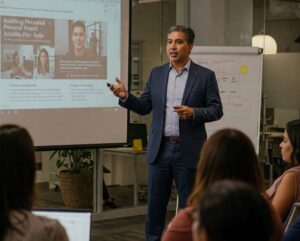Understanding Trust in Professional Relationships
Trust in a professional context is a vital component that underpins collaboration, communication, and effective teamwork. It can be defined as the belief in the reliability, integrity, and competence of colleagues and leaders. When trust exists within a team, individuals are likely to share ideas openly, provide constructive feedback, and engage in problem-solving without the fear of judgment. This openness fosters an environment conducive to innovation and collective success.
The significance of trust extends beyond interpersonal relationships; it profoundly influences workplace dynamics and productivity. In a trust-filled environment, employees are more motivated, displaying higher job satisfaction and engagement levels. They are more likely to invest time and effort into their work because they feel supported by their peers and management. This psychological safety encourages individuals to take calculated risks and contribute their unique perspectives, which enhances overall team performance.
Conversely, a lack of trust can lead to a detrimental workplace culture characterized by suspicion and hesitation. When trust is absent, communication breakdowns often occur, resulting in misunderstandings and conflicts that can hinder productivity. Employees may withhold information or refrain from collaborating effectively, ultimately impacting the organization’s ability to achieve its goals. For new professionals, establishing trust is crucial not only for individual success but also for fostering team cohesion and effectiveness.
Building trust as a new professional involves demonstrating reliability, maintaining transparency, and respecting the contributions of others. By consistently meeting commitments and valuing open communication, newcomers can integrate themselves into the organizational culture more seamlessly. This foundation of trust is essential for cultivating lasting professional relationships that promote collaboration and career growth.
The Importance of Authenticity
In today’s professional landscape, the significance of authenticity cannot be overstated. As new professionals enter the workforce, they often face the challenge of presenting themselves in a manner that aligns with the corporate culture while still being true to their personal values and beliefs. Genuine interactions lay the groundwork for trust-building among colleagues, creating an environment where open communication and collaboration can thrive.
Authenticity in professional relationships fosters deeper connections. When individuals present their true selves, they cultivate an atmosphere of trust and respect. Colleagues are more likely to engage sincerely when they perceive others as genuine. This sense of genuineness encourages pivotal conversations, leading to enhanced teamwork and fewer misunderstandings. By embracing authenticity, one can effectively contribute to a culture of openness that is essential for success in any professional setting.
Moreover, maintaining authenticity doesn’t necessitate sacrificing professionalism. Striking this balance requires intentionality. Professionals can express authenticity by sharing personal insights relevant to their work, which can enrich discussions and encourage others to do the same. However, it is essential to gauge the appropriateness of personal disclosures based on the context and audience. Approaching discussions with a focus on shared goals while still allowing personal voice to emerge can help sustain a professional demeanor while promoting genuine interactions.
Additionally, it is vital to remain open to feedback. Acknowledging the perspectives of colleagues and adjusting one’s approach accordingly can enhance mutual understanding without compromising one’s authenticity. Embracing such strategies enables newcomers to foster meaningful relationships within their professional networks, ultimately leading to increased job satisfaction and career advancement. In conclusion, prioritizing authenticity within the workplace is crucial for building trust, facilitating positive interactions, and enhancing overall career success.
Effective Communication Skills
Effective communication skills are pivotal in building trust as a new professional, as they directly influence how messages are received and perceived within the workplace. One essential component of effective communication is active listening. This skill involves paying full attention to the speaker, acknowledging their message, and responding thoughtfully. By practicing active listening, professionals can create a supportive atmosphere where colleagues feel valued and heard. Techniques such as nodding or paraphrasing what has been said can enhance this process, fostering an environment conducive to trust and collaboration.
Clarity in messaging is another critical element of effective communication. New professionals must articulate their thoughts clearly and concisely to avoid misunderstandings and ensure that their intentions are effectively communicated. Utilizing simple language and structuring messages logically can aid in conveying information more effectively. Additionally, being aware of non-verbal cues such as body language and tone can significantly impact how messages are interpreted, thus emphasizing the importance of a mindful approach to communication.
Open dialogue facilitates a transparent working relationship, allowing for the exchange of ideas and concerns in a constructive manner. This can be achieved by encouraging questions and feedback, demonstrating a willingness to engage in discussions that promote understanding. Embracing diverse perspectives and being open to constructive criticism not only fosters trust but also enhances teamwork and collaboration among professionals.
Improving communication skills requires commitment and practice. New professionals may consider role-playing scenarios, seeking feedback from peers, or participating in communication workshops to enhance their abilities. By honing these skills, individuals will not only build trust with colleagues but also contribute to a more nurturing and productive workplace.
Consistency and Reliability
In the professional landscape, the importance of consistency and reliability cannot be overstated. These qualities serve as the bedrock of trust in the workplace. When individuals regularly meet deadlines, honor commitments, and deliver quality work, they cultivate an environment where trust flourishes. This trust is not simply beneficial; it is essential for fostering collaboration and effective communication among team members.
One practical way to demonstrate consistency is through the punctuality of task completion. For instance, a new project manager may face initial challenges when deadlines loom. However, by proactively managing their time and remaining committed to completing tasks ahead of schedule, they establish a reputation for reliability. Such proactive behavior not only enhances their credibility but also encourages team members to depend on their leadership.
Furthermore, reliability is exemplified through accountability. Consider a scenario where a team member is assigned a critical presentation. If they practice diligent preparation, communicate progress with peers, and address any arising issues promptly, they contribute to an atmosphere of trust. Colleagues are more likely to align with someone who demonstrates a steadfast commitment to their responsibilities, reinforcing that individual’s role within the team.
Real-life examples abound in various industries, showcasing how reliability breeds trust. In a software development setting, a team that repeatedly delivers updates on time and communicates effectively is likely to strengthen its relationships with stakeholders. As clients witness consistent performance, they are more inclined to engage further with the team, cementing a foundation of trust that can lead to further successful collaborations.
In summary, fostering trust through consistency and reliability is a critical strategy for new professionals. By establishing and maintaining a steady track record in their work, individuals can significantly impact their relationships and professional growth within their organizations.
Building Relationships Through Engagement
Establishing meaningful professional relationships is a cornerstone of a successful career, particularly for new professionals. One effective strategy for fostering these connections is engaging with colleagues both within and outside the workplace. Engaging in conversations during breaks, attending social events, or participating in team-building activities can significantly enhance workplace relationships. Such interactions often lead to deeper understandings of team dynamics and promote a supportive environment conducive to trust-building.
Networking plays a crucial role in expanding one’s professional circle. While traditional networking events and industry conferences are valuable, building relationships can also occur in informal settings. Engaging in online communities related to your field, such as professional social media platforms, can further strengthen these connections. Joining forums or participating in webinars not only facilitates knowledge exchange but also allows for networking with individuals who share similar interests and goals.
Additionally, active participation in team activities encourages collaboration and enables colleagues to understand one another’s strengths and weaknesses. By volunteering for projects, attending group meetings with an open mindset, and expressing a willingness to assist others, you demonstrate commitment to the team’s objectives. This involvement not only bolsters trust but also emphasizes your value as a team member, fostering a collaborative environment where each member feels appreciated and respected.
Lastly, it is essential to embrace open communication as a foundation for relationship-building. Regularly seeking feedback, offering assistance, and engaging in meaningful conversations can significantly enhance interpersonal relationships. Individuals who feel heard and appreciated are more likely to reciprocate, contributing to a nourishing atmosphere of trust. By integrating these strategies, new professionals can effectively build relationships through engagement, ultimately leading to a more enjoyable and productive work experience.
Demonstrating Competence and Confidence
Establishing trust as a new professional largely hinges on the ability to demonstrate competence and confidence in one’s role. It is imperative for individuals entering the workforce to showcase their skills and knowledge effectively. Highlighting one’s competencies, whether through the execution of tasks, communication of ideas, or contribution to team objectives, serves as a tangible representation of one’s capability. This not only assures colleagues and supervisors of one’s proficiency but also positions an individual as a reliable team member.
Confidence, when balanced with a degree of humility, fosters an environment in which trust can flourish. New professionals should strive to present their capabilities assertively, ensuring that their confidence becomes a catalyst for collaboration and innovation, rather than a barrier. Confidence can be exhibited in various forms, such as presenting ideas during meetings, providing constructive feedback, or taking initiatives that can lead to improvements within the team or organization. This assertiveness can inspire trust and respect from peers, as they perceive a commitment to performing at a high caliber.
However, demonstrating competence does not imply an absence of humility. Acknowledging the limits of one’s knowledge and being open to learning from others can significantly enhance interpersonal relationships in a professional setting. This humility facilitates a culture of continuous improvement and collective growth. Colleagues and supervisors are likely to trust professionals who are not only capable but also willing to seek guidance and learn from their experiences.
In summary, the dual demonstration of competence and confidence is crucial for new professionals aiming to build trust. Through a combination of assertive knowledge sharing and a humble approach to collaboration, individuals can forge strong relationships with their peers and create a foundation of trust that is necessary for professional development and success.
Seeking and Offering Feedback
Effective communication is at the heart of building trust in any professional setting. One of the most impactful aspects of this communication is the exchange of feedback. Seeking and offering feedback creates a reciprocal relationship that enhances the trust between colleagues, superiors, and subordinates. To cultivate an environment conducive to giving and receiving feedback, it is essential to approach it with the right mindset and strategies.
When requesting feedback, it is vital to be specific about what areas you want input on. Vague questions can lead to ambiguous responses that may not be helpful. For example, instead of asking, “What do you think?” one might say, “Could you provide your insights on my presentation’s clarity and engagement?” This specificity helps the feedback provider focus their critique on areas that matter most to you. Additionally, choosing the right time and context is crucial; approaching colleagues in a quiet space where they feel comfortable can significantly increase the likelihood of receiving thoughtful, constructive feedback.
On the flip side, offering feedback requires a delicate balance to ensure that it is constructive and supportive. One effective strategy is to utilize the “sandwich method,” wherein positive comments are placed before and after the critique. This approach not only highlights strengths but also makes the receiver more receptive to areas of improvement. Furthermore, it is important to deliver feedback based on observable behaviors rather than personal traits, as this helps to avoid defensiveness that can undermine trust.
Finally, following up on feedback is crucial. This step demonstrates a commitment to improvement and helps to solidify the trust within the professional relationship. By asking for clarification or seeking further input after implementing suggestions, both parties can reinforce their collaboration. Overall, the mutual exchange of feedback serves as a cornerstone in building lasting trust, facilitating a more efficient and harmonious work environment.
Honoring Confidentiality and Integrity
In the professional realm, trust is a cornerstone for success, and it is built upon ethical principles such as confidentiality and integrity. Maintaining confidentiality involves safeguarding sensitive information, and it is crucial when working with clients, colleagues, or any stakeholders. Breaching this confidentiality, whether intentionally or unintentionally, can have severe repercussions, including damaged relationships, loss of credibility, and potential legal implications. Therefore, it is imperative for new professionals to understand and respect the importance of confidentiality in their dealings.
Integrity complements confidentiality, as it requires professionals to act honestly and responsibly in all interactions. When individuals fail to uphold these ethical standards, even minor breaches can lead to a breakdown of trust. For instance, sharing confidential information without permission, regardless of the intended purpose, can lead to significant distrust among team members or clients. This scenario illustrates how even unintentional missteps can result in a lasting negative impact on one’s professional reputation.
To safeguard confidentiality and integrity, new professionals can adopt several strategies. First, clearly communicate the importance of confidentiality from the outset of any professional relationship. Establishing clear expectations sets the tone for trust and fosters an environment of openness. Additionally, practicing active listening helps professionals ensure they fully understand the boundaries of the information shared with them. Regular training on confidentiality policies and ethical practices can also equip new professionals with the necessary skills to navigate complex situations.
Furthermore, it is essential to create secure systems for information handling, such as using encryption tools or secure file-sharing methods. This not only protects sensitive data but also reinforces a professional’s commitment to honoring confidentiality. By embracing these strategies, new professionals can cultivate an environment of trust that is fundamental to their success and fosters enduring relationships built on mutual respect.
Continuous Improvement and Adaptability
In the rapidly evolving landscape of today’s professional environment, continuous improvement and adaptability are crucial traits for emerging professionals. The ability to learn, grow, and develop new skills not only enhances one’s personal capabilities but also significantly contributes to fostering trust among colleagues and supervisors. When professionals demonstrate a commitment to their own development, it signals a proactive attitude that others often respect and appreciate.
Being adaptable means being willing to embrace change and efficiently navigate new challenges. As industries shift and evolve, professionals who can adjust their strategies and approaches are often viewed as reliable and trustworthy team members. They prove their value by finding innovative solutions to problems and maintaining composure in the face of uncertainty. This flexibility not only solidifies their position within the team but also encourages collaboration, as team members feel more secure in relying on someone who is open to growth and change.
Initiative plays a pivotal role in this process. By actively seeking opportunities for professional development, such as attending workshops, pursuing certifications, or engaging in mentorship programs, individuals position themselves as committed to their career paths. This display of commitment is instrumental in building trust, as colleagues recognize the effort made to improve and adapt. Moreover, sharing newfound knowledge and skills with the team can inspire a culture of continuous learning within the workplace, further reinforcing collective trust and reliability among team members.
In summary, prioritizing continuous improvement and demonstrating adaptability are vital strategies for new professionals looking to establish themselves in the workplace. By actively engaging in personal and professional development, maintaining openness to change, and contributing to a culture of growth, individuals can cultivate a trustworthy reputation that enhances their career prospects.




